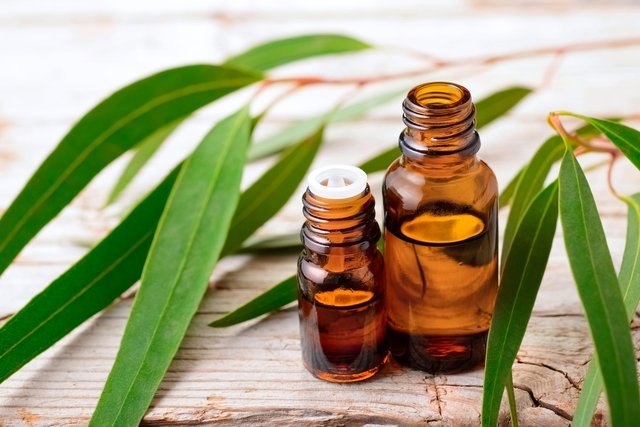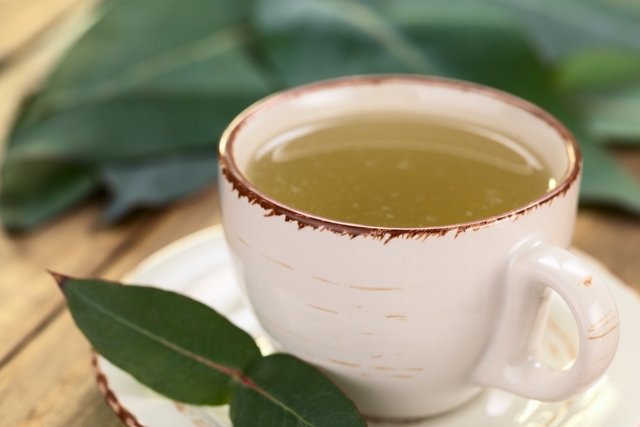Eucalyptus is a medicinal plant that is rich in tannins, flavonoids, aldehydes and volatile oils, such as cineole and terpineol. These components give eucalyptus its antiseptic, decongestant, antispasmodic and antimicrobial properties, and is widely used as a home remedy for the treatment of respiratory problems, such as flu, colds or sinusitis.
The scientific name of eucalyptus is Eucalyptus globulus and the part that is most commonly used is its leaves or its essential oil. These can be used to prepare tea, inhalations, compresses, baths or to aromatize the environment. Read more about the health benefits eucalyptus tea and how to prepare it.
Eucalyptus can be easily found in pharmacies and natural health stores. It should be used as guided by a doctor or medicinal plant specialist.

Health benefits
Eucalyptus has several health benefits, including:
1. Combating respiratory problems
The cineole present in eucalyptus has expectorant, mucolytic and anti-inflammatory properties, which help to promote breathing, relieve coughing, increase phlegm elimination and relax the respiratory muscles.
Therefore, eucalyptus essential oil can be inhaled to help combat respiratory problems, such as the flu, colds, cough, stuffy nose, runny nose, sore throat, asthma, bronchitis or sinusitis.
However, some people may be more sensitive to the essential oil released by eucalyptus, and it may actually worsen respiratory issues. Therefore, it should only be used as directed by a doctor or medicinal plant specialist.
2. Promoting skin healing
Eucalyptus leaf essential oil has antiseptic, anti-inflammatory and antibacterial action and can be used on the skin to accelerate the healing of superficial, closed wounds, such as burns, cuts or scratches.
Furthermore, eucalyptus essential oil contains macrocarpal A, a substance that, when applied to the skin, stimulates the production of ceramide. This is a type of fatty acid responsible for maintaining the skin's protective barrier and retaining moisture. Therefore, it can be a great natural way to combat dry skin, dandruff, dermatitis or psoriasis.
Also recommended: Home Remedies for Dandruff: 8 Options & Recipes tuasaude.com/en/home-remedies-for-dandruff3. Strengthening the immune system
Eucalyptus is rich in essential oils that naturally contain anti-inflammatory and immunomodulatory action. These can help to strengthen the immune system and stimulate the action of white blood cells to prevent and combat respiratory infections, like the flu, colds or sinusitis.
4. Reducing pain
Eucalyptus is rich in substances with analgesic action, such as cineole, terpineol and limonene. These help to reduce pain, as they are easily absorbed by muscles or nerves when the essential oil is massaged into the skin for massage or in aromatherapy.
One study [1] carried out in lab rats showed that the terpineol present in eucalyptus can be used in massage therapy to help relieve sciatica pain and reduce inflammation. It can block nerve conduction and reduce pain.
Furthermore, eucalyptus essential oil can help reduce muscle, tendon or nerve pain, and relieve symptoms of rheumatism or fibrosis.
5. Improving oral health
Eucalyptus is rich in eucalyptol, ethanol and macrocarpal C, that have antibacterial and antiseptic action. It can help to remove and eliminate that bacteria in the mouth that cause gingivitis or bad breath. Eucalyptus can be used as a mouthwash to maintain optimal oral health.
6. Fighting infections
Eucalyptus essential oil has antibacterial action and can be useful to combat infections such as gastroenteritis or UTIs that are caused by Staphylococcus aureus or Escherichia coli bacteria.
However, the use of eucalyptus essential oil does not replace medical treatment for these infections and should only be used as a complement to medical treatment.
7. Treating cold sores
Because it contains antiviral, analgesic, anti-inflammatory, healing and antioxidant substances, eucalyptus can help in the treatment of cold sores. It can relieve symptoms such as itching, burning sensations, redness and swelling.
Eucalyptus essential oil can be used in the form of ointments, found in pharmacies. It can be applied in the first symptoms of cold sores until wounds start to erupt. Although it does not replace medical treatment, it is a natural option to relieve symptoms and speed up recovery from cold sores.
Also recommended: 11 Home Remedies for Cold Sores tuasaude.com/en/home-remedies-for-cold-sores8. Promoting relaxation
Eucalyptus essential oil, when inhaled, can help you to relax, as it has a calming and anxiolytic effect. It helps to reduce the activity of the nervous system and promote relaxation, which can be useful to help treat stress, anxiety or sleep problems.
9. Preventing chronic diseases
Eucalyptus leaves are rich in flavonoids, such as catechin, luteolin, kaempferol, phloretin, quercetin and isoramnetin, that have potent antioxidant action. They help to reduce cell damage caused by free radicals, which can prevent the development of cardiovascular disease or dementia.
However, more studies are still needed to support this benefit.
How to use
The parts of eucalyptus plants that are most typically used are the dried or fresh leaves or the essential oil extracted from it. These can be used to prepare tea, baths, compresses, inhalations, balms, massages or aromatherapy.
It is important to note that eucalyptus essential oil should not be ingested orally, as it can cause burns to the digestive system as well as kidney problems. Additionally, before using it on the skin, it should always be diluted with water or mixed with a "carrier" oil, such as mineral oil, coconut oil or sweet almond oil. This allows the eucalyptus essential oil to be better absorbed into the skin and does not cause irritation.

1. Eucalyptus tea
Eucalyptus tea is widely used to relieve cold and flu symptoms, as well as helping to eliminate lung secretions that can accumulate with bronchitis.
Ingredients
- 1 tablespoon of chopped eucalyptus leaves
- 150 mL of water
Directions
Add the chopped eucalyptus leaves to the water and boil for 1 minute. Turn off the heat, cover and let it rest for about 5 minutes. Then strain and drink one cup of tea 2 to 3 times a day.
2. Inhalation with eucalyptus steam
Inhaling eucalyptus vapor is a great home remedy for respiratory conditions like asthma, bronchitis, flu, colds and sinusitis, as it quickly relieves nasal congestion.
However, there are some people who may be more sensitive to the essential oil released by eucalyptus and, in these cases, symptoms may worsen. If this happens, you should avoid performing this inhalation.
Ingredients
- 5 drops of eucalyptus essential oil or 1 handful of fresh eucalyptus leaves
- 1 liter of boiling water
Directions
Add the drops of eucalyptus essential oil or leaves to the boiling water. Then, place your face over the bowel and cover your head and the bowl with a towel. Inhale the steam as deeply as possible for up to 10 minutes, repeating 2 to 3 times a day. This towel helps keep the vapor for longer.
When you finish inhaling, it is important to wipe your face with a towel soaked in cold water.
Also recommended: Tea for Congestion: 8 Natural Remedies for a Plugged Nose tuasaude.com/en/tea-for-congestion3. Eucalyptus bath
A bath with eucalyptus can be prepared to help relax and relieve muscle pain, or to treat respiratory problems.
Ingredients
- Branches with eucalyptus leaves
Directions
Wash the eucalyptus leaf branches to remove dust or dirt. Leave them to dry naturally. Then, make a bouquet with the branches and hang it from the shower head. It is important that the branches are not in direct contact with the bath water. Take a shower normally, so that the steam naturally releases the essential oils into the environment. When inhaled, these can help to relieve nasal congestion.
3. Eucalyptus aromatherapy
Aromatherapy is a technique that uses the aroma and particles released by essential oils to stimulate different parts of the brain. Eucalyptus essential oil can help to relieve symptoms of anxiety, emotional tension or stress, as it has calming and sedative properties.
To perform aromatherapy with eucalyptus, you must deeply inhale the aroma of the essential oil directly from the bottle. Hold your breath in your lungs for 2 to 3 seconds, then exhale. Repeat this inhalation exercise 3 to 7 times, several times a day.
Another way to perform aromatherapy with eucalyptus essential oil is to add 2 to 3 drops of eucalyptus essential oil in some water, and then pour this solution into an electric air freshener or in a room diffuser. The amount of water used varies depending on the capacity of the electric air freshener or diffuser. The cloud of smoke or vapor formed allows the aroma to be released throughout the room.
Another, more economical solution to using the aromatizer is to place 10 drops of eucalyptus essential oil or 6 eucalyptus leaves in a bowl of boiling water and to place into a room. As the water evaporates, the aroma is released into the air. .
4. Eucalyptus massage
Eucalyptus essential oil can also be used in relaxing massages due to its pleasant aroma and relaxing properties.
To perform the massage, use 5 to 10 drops of eucalyptus essential oil mixed with 50 mL of a plant-based oil, such as coconut oil or sweet almond oil. Then, apply to the skin, massaging gently with your fingertips, for about 10 minutes.
Before using eucalyptus essential oil, you should complete an allergy test. Prepare a mixture containing 1 drop of eucalyptus essential oil in 1 teaspoon of carrier oil, and apply it to the back of the hand or the crease of your elbow. Wait 24 hours and, if during this period the skin becomes red or irritated, you are not advised to use eucalyptus essential oil.
5. Eucalyptus balm
Eucalyptus balm can be prepared and used on the chest to relieve symptoms of respiratory problems like colds, the flu, bronchitis or asthma.
Ingredients
- 10 drops of eucalyptus essential oil
- 30 mL of almond oil
Directions
Mix the ingredients in a clean, dry container. Then apply to the chest. The scent released by the balm helps to relieve a runny or plugged nose.
Also recommended: How to Stop a Runny Nose: 6 Natural Remedies tuasaude.com/en/how-to-stop-a-runny-nose6. Eucalyptus compresses
Eucalyptus compresses can be used to treat skin inflammation, muscle or joint pain, sciatic pain, rheumatism or gout.
Ingredients
- 10 drops of eucalyptus essential oil
- 60 mL of water
Directions
Mix the ingredients and soak gauze, cotton or cloth in the solution. Then apply to the skin of the affected region.
Possible side effects
The most common side effects that may occur when using eucalyptus are nausea, vomiting, diarrhea, difficulty breathing, dizziness, feelings of suffocation, tachycardia, drowsiness or hyperactivity.
Furthermore, eucalyptus essential oil used on the skin can trigger dermatitis, skin irritation or burning, so it should always be tested on a small area of the skin beforehand.
Eucalyptus tea can also increase liver action and reduce the effect of some medications. Therefore, people who use any medications on a daily basis should consult their doctor to determine out whether it is safe to use eucalyptus or not.
Contraindications for use
Eucalyptus should not be used by children under 3 years of age, during pregnancy or breastfeeding, or by people who have digestive problems like gallbladder and liver disease.
Eucalyptus inhalations should also not be used by children under 12 years of age, as they can cause allergies and shortness of breath. Furthermore, eucalyptus preparations should not be applied to the face, particularly to the nose of young children, as they can cause skin irritation.
Furthermore, eucalyptus essential oil should not be used directly on the skin without being mixed with a carrier oil or water, as it may cause irritation, burning or skin allergies.
